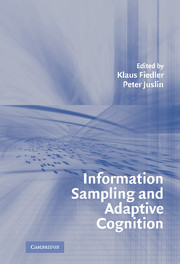Book contents
- Frontmatter
- Contents
- List of Contributors
- PART I INTRODUCTION
- PART II THE PSYCHOLOGICAL LAW OF LARGE NUMBERS
- PART III BIASED AND UNBIASED JUDGMENTS FROM BIASED SAMPLES
- 6 Subjective Validity Judgments as an Index of Sensitivity to Sampling Bias
- 7 An Analysis of Structural Availability Biases, and a Brief Study
- 8 Subjective Confidence and the Sampling of Knowledge
- 9 Contingency Learning and Biased Group Impressions
- 10 Mental Mechanisms: Speculations on Human Causal Learning and Reasoning
- PART IV WHAT INFORMATION CONTENTS ARE SAMPLED?
- PART V VICISSITUDES OF SAMPLING IN THE RESEARCHER'S MIND AND METHOD
- Index
- References
6 - Subjective Validity Judgments as an Index of Sensitivity to Sampling Bias
Published online by Cambridge University Press: 02 February 2010
- Frontmatter
- Contents
- List of Contributors
- PART I INTRODUCTION
- PART II THE PSYCHOLOGICAL LAW OF LARGE NUMBERS
- PART III BIASED AND UNBIASED JUDGMENTS FROM BIASED SAMPLES
- 6 Subjective Validity Judgments as an Index of Sensitivity to Sampling Bias
- 7 An Analysis of Structural Availability Biases, and a Brief Study
- 8 Subjective Confidence and the Sampling of Knowledge
- 9 Contingency Learning and Biased Group Impressions
- 10 Mental Mechanisms: Speculations on Human Causal Learning and Reasoning
- PART IV WHAT INFORMATION CONTENTS ARE SAMPLED?
- PART V VICISSITUDES OF SAMPLING IN THE RESEARCHER'S MIND AND METHOD
- Index
- References
Summary
The 1990s are associated with keywords like new economy and information society. The increased importance of information technologies underlying these phenomena was due primarily to the transformation of the Internet into a medium of mass communication, but the rising number of 24/7 TV stations and the popularity of cellular phones contributed as well. As one side effect of these developments, people in the early twenty-first century are confronted with an unprecedented flood of statistical information. Statistics on almost any topic are available anywhere at any time, whether on the latest unemployment rates, recent trends in climate change, or the odds ratio that a football match will end in a draw when the away team leads by two goals at halftime. At least to anyone trained in statistics, however, the question presents itself whether people have the skills necessary to deal with the available information critically. After all, citizens, politicians, consumers, and managers still have to decide on their own whether to trust a statistic and the conclusions derived from it.
A glance at the major findings accumulated by the heuristics and biases program during the past decades suffices to substantiate a skeptic's position. People have been shown, among other things, to prefer individuating information to base-rate information when estimating conditional probabilities (Bar-Hillel, 1980; Kahneman & Tversky, 1972), to collapse data over levels of significant third variables (Schaller, 1992a, b), and to confuse the conditional probability of a criterion event (e.g., becoming a drug addict) given a predictor event (e.g., having consumed marijuana) with its inverse (Evans, 1989; Sedlmeier, 1999).
- Type
- Chapter
- Information
- Information Sampling and Adaptive Cognition , pp. 127 - 146Publisher: Cambridge University PressPrint publication year: 2005
References
- 1
- Cited by



